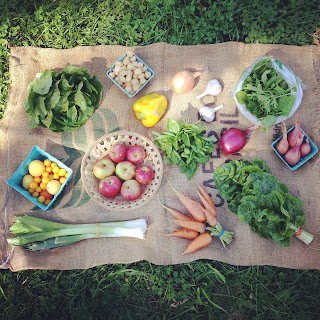Grow Organic
Another year, a new
organic certificate and inspection passed with flying colors and no changes needed. It feels good to be an organic producer.
At Alternative Roots Farm we believe that the right way to grow produce for our community is to grow organic. We never questioned this. There are arguments we hear, floating around the farming community, against this step, but they just aren't convincing to us to skip something so vital. The organic label is assurance to our customers that there are no synthetic chemicals on the food they are eating, we are caring for our land with organic management (crop rotation, organic matter, wildlife habitat) and no GMO crops are grown.
It is the
only label that has solid, regulatory weight behind it that consumers can trust there are no chemicals and GMOs used. Many other claims, such as "natural" and "beyond organic," do not have any regulation for them. In a society where folks are hopping on the sustainability bandwagon, there is so much greenwashing of products it can be confusing when making purchasing decisions - organic eliminates this confusion.
 |
| ARF has been certified organic since August 2014. |
Now, there are still ways organic could improve, but I feel it is a solid, trustworthy label for produce and produce products, while improvements for animal products are needed (in my opinion). When it comes to meat and eggs I would continue to use a skeptical eye and try to learn about your farmers and farms the products come from - buy local. "Access to pasture" is not the same as actually being out on pasture. With any good thing, such as a growing organic industry, there are going to be businesses that take advantage where there are profits to be made.
A Peek at the Certification Process
That brings me to the certification process behind organics. Each year, every organic operation - whether a grower, or processing facility - an organic business must work with their certification agency to apply annually for
renewed certification. Then a third party, independent inspection agent makes a farm visit to verify paperwork, after which they report back to the certification agency, who reviews the report and makes a final determination of organic status.
 |
| Certified organic by the Midwest Organic Services Association. |
Paperwork and records are reviewed. Seed tags and bags and catalogs are saved for 5 years of accountability. Harvest data is checked to jive with what we are growing, to make sure folks aren't buying in and calling stuff organic that isn't. Seed to sale the inspector wants to be able to trace a product, for validity. What that looks like is our inspector, pulling out a sales receipt and having me trace that back to when and where it was harvested. There are various other paper trail details like this.
Arguments Against Organic
So, why do fellow farmer folks argue against organic?
"The paperwork." Well, yes, there is paperwork, but in essence this is paperwork you want to do to be a good farmer, or business person, anyways. It's a little more work the first year of certification, then easy review and updating following that.
"The Man." Yes, it is the government, and government regulations, which sometimes seem ass-backwards, but it's the way it is - deal with it. I file some paperwork, legally, federally filed paperwork that acts as a great insurance to our business and then I get to farm how I want. The government is not running my operation. I rotate crops on my schedule, plant the seeds that I want. Big Brother is never a presence on our farm.
There are other arguments, but these tend to be the main ones. I get frustrated by farms marketing as "Beyond Organic" which has no basis and confuses the organic name, confuses consumers we work so hard to educate and, frankly, is illegal. There are those that say we should not have to apply to not use chemicals, it's the conventional farmers that should apply to use chemicals (so much truth to that), but again...this is the way it is.
The hoops are worth jumping through for you, for our community, for education on real food. This isn't just about our farm, it's about our countries broken food system as well. It's as much a political statement as it is a small business decision.
Buy organic, support organic. For sustainable farms and food and future.


















































